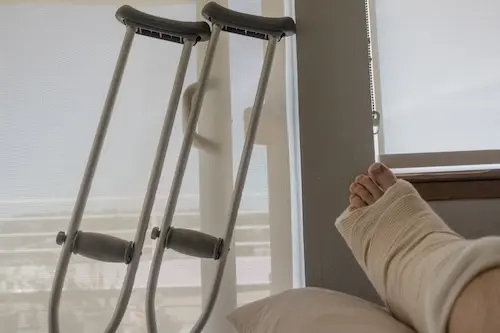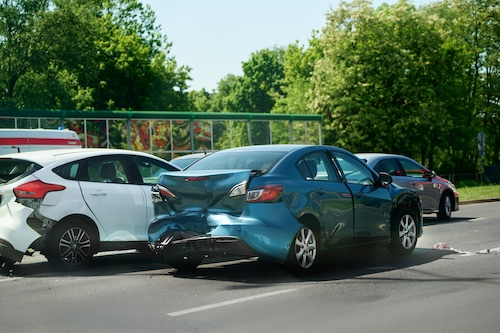Understanding the Impact of Car Accident Injuries on Victims
Car accidents are a leading cause of both minor and serious injuries across the United States. Whether it’s a rear-end crash or a high-speed collision, the types of injuries sustained can range from soft tissue damage to traumatic brain injuries.
Understanding the implications of these injuries is crucial for accident victims. If you or a loved one has been involved in a motor vehicle crash, speaking with a Knoxville car accident lawyer can be an essential first step in seeking justice and support.
This blog highlights the critical need for awareness, prevention, and proper treatment following vehicle crashes. By understanding the range of potential injuries and their lasting impacts, accident victims can better navigate their path to healing and justice.
The Scope of Car Accident Injuries
Car accident injuries vary greatly depending on several key factors. The severity of the crash, the type of motor vehicle involved, the speed at the time of the collision, and whether occupants were wearing seat belts all significantly impact the types and extent of accident injuries sustained. Even a seemingly minor fender-bender can result in painful soft tissue injuries, while high-speed collisions may lead to severe trauma like spinal cord damage or traumatic brain injuries.
Injuries may also vary based on where each individual was seated in the car, the angle of impact, and whether airbags deployed correctly. Accident victims can experience anything from bruises and contusions to internal bleeding, fractured bones, and emotional trauma. Recognizing these variables helps illustrate just how unpredictable and serious car accident injuries can be.
Types of Car Accidents That Lead to Injuries
Each accident scenario presents unique risks and types of injuries.
- Rear-end collisions often result in whiplash and spinal trauma.
- Side-impact crashes can cause chest, shoulder, and internal injuries.
- Head-on collisions typically lead to severe injuries, including fractures and traumatic brain injuries.
Soft Tissue Injuries: The Most Common Car Accident Injuries
Soft tissue injuries are extremely common in motor vehicle crashes and include damage to muscles, ligaments, and tendons.
- Whiplash: Often from rear-end collisions; affects neck and upper spine.
- Sprains and strains: These injuries may seem minor but can lead to long-term discomfort.
- Contusions: Deep bruising that can indicate internal bleeding.
Bone Fractures and Broken Bones
Broken bones are among the most visible and painful car accident injuries. These injuries occur when the force of a motor vehicle crash places sudden and extreme pressure on the bones, causing them to break or shatter. The severity of a fracture can range from simple hairline cracks to complex compound breaks involving multiple fragments of bone.
- Fractures can affect any part of the body, especially limbs, ribs, hips, and facial bones. The arms, legs, and collarbone are among the most frequently broken areas due to their exposure in vehicle crashes.
- Compound fractures break through the skin and may involve damage to surrounding muscles, tissues, and blood vessels. These severe injuries often require immediate surgical intervention and can pose a high risk of infection.
- Stress fractures or hairline fractures may not be immediately apparent after a car accident but can worsen over time if untreated.
- Comminuted fractures result when bones break into multiple pieces, making treatment and recovery more complex.
Recovery from broken bones may include immobilization with casts or splints, physical therapy, and possibly multiple surgeries. Accident victims with severe fractures often face months of rehabilitation and may suffer from chronic pain or limited mobility as a long-term consequence.
Head Injuries and Traumatic Brain Injury (TBI)
Head injuries range from minor concussions to severe brain damage, and they are among the most alarming types of car accident injuries due to their potential for permanent, life-altering effects. Even a low-speed crash can cause the head to strike a window, steering wheel, or airbag, resulting in trauma that might not show immediate symptoms.
- Concussions: Often overlooked but can lead to long-term cognitive issues such as memory loss, difficulty concentrating, mood swings, and sensitivity to light or noise. While some concussions resolve with rest, repeated or untreated concussions can result in chronic traumatic encephalopathy (CTE).
- TBI: One of the most serious injuries that can result from a motor vehicle crash. Traumatic brain injuries may impact memory, speech, motor skills, emotional regulation, and overall brain function. Severe TBIs can lead to permanent disability, necessitating long-term medical care, therapy, and in some cases, assisted living support.
Victims suffering from head injuries often require extensive diagnostic evaluations including MRIs and CT scans. Depending on the severity, treatment may range from medication and rest to brain surgery and cognitive rehabilitation. The emotional and financial toll of head injuries is significant, making early detection and comprehensive care critical for recovery.
Spinal Cord Injuries and Paralysis
Spinal injuries are often life-altering and may result in permanent disability. These injuries typically occur when a violent impact damages the vertebrae or severs the spinal cord, leading to impaired nerve signals between the brain and the body.
- Paraplegia or quadriplegia can occur depending on the injury’s location along the spinal cord. Injuries lower on the spine may result in loss of function in the legs, while injuries higher up can affect the arms, trunk, and even breathing.
- These injuries often require lifelong care and treatment, including surgeries, physical therapy, mobility aids like wheelchairs, and home modifications. In many cases, accident victims must adapt to a new lifestyle, both physically and emotionally.
Internal Injuries: Hidden but Deadly
Internal bleeding and organ damage are not always immediately apparent after a car accident. These injuries can be especially dangerous because symptoms may take hours or even days to manifest.
- Liver and spleen injuries: Common in high-impact crashes where the abdomen absorbs much of the force. These organs are highly vascular, making them especially prone to serious bleeding.
- Internal bleeding: Requires emergency medical intervention and can be life-threatening if not diagnosed quickly. Blood loss into the chest, abdomen, or brain can result in shock or death without immediate care.
Neck and Back Pain After a Collision
Chronic neck and back pain is common, especially in rear-end crashes. These types of pain can be indicators of more serious injuries that aren’t always visible.
- May indicate underlying spinal or soft tissue injuries, such as herniated discs or whiplash, which can lead to persistent discomfort and mobility issues.
- Pain may worsen over time without proper treatment, often requiring a combination of chiropractic care, physical therapy, and sometimes surgery to correct or manage the damage.
Knee Injuries: Impact with the Dashboard
Knee injuries can significantly affect mobility and quality of life. These injuries are common when the knees strike the dashboard or steering column during a collision.
- Ligament tears (ACL, MCL): May require surgery and physical therapy. These injuries can take months to heal and may result in long-term instability or chronic pain.
- Fractures: Often need immobilization or reconstruction. In some cases, pins, plates, or screws are used to stabilize the bone. Recovery often includes rehabilitation to restore strength and range of motion.
Shoulder Injuries from Seat Belt Restraint
Seat belts save lives, but can cause shoulder injuries in severe collisions. The restraint can strain or tear muscles and joints in the shoulder during sudden deceleration.
- Rotator cuff injuries: Common in side-impact crashes and can lead to pain, weakness, and limited range of motion. Recovery often includes physical therapy or even surgery.
- Dislocations: Painful and may require surgical correction. Shoulder dislocations can stretch or tear surrounding ligaments and tissues, sometimes causing chronic instability or recurring dislocations.
Chest Injuries: Broken Ribs and Cardiac Trauma
Chest injuries are especially dangerous due to their proximity to vital organs. The force of a seat belt or airbag can compress the chest, leading to painful and serious injuries.
- Broken ribs: Can puncture lungs or damage internal organs. Breathing may become difficult, and patients often experience intense pain with each breath or movement.
- Blunt force trauma: May result in cardiac contusions or bruising of the heart muscle, which can interfere with normal heart function. Immediate evaluation is necessary to rule out life-threatening complications.
Psychological Injuries: PTSD and Emotional Trauma
Post Traumatic Stress Disorder (PTSD) can be just as debilitating as physical injuries. Many accident victims relive the trauma of a crash long after their physical wounds have healed.
- Symptoms include flashbacks, anxiety, and depression. Victims may avoid driving or riding in cars, experience nightmares, and have heightened stress responses.
- Often requires long-term psychological treatment such as cognitive behavioral therapy, medication, and support groups. Addressing these emotional wounds is essential for holistic recovery.
Long-Term Impacts of Car Accident Injuries
Many accident injuries have long-term health and financial consequences that persist well after the initial recovery period.
- Chronic pain: May limit daily activities and reduce quality of life. Pain may stem from soft tissue injuries, nerve damage, or unresolved fractures.
- Reduced earning potential: Due to inability to work or having to switch to a less physically demanding job. In severe cases, individuals may be unable to return to the workforce at all.
- Ongoing treatment: Including physical therapy, medication, or surgeries, which can continue for years. These treatments often place a significant financial burden on victims and their families.
Medical Treatment and Emergency Care
Immediate medical attention is crucial to assess the severity of injuries.
- Diagnostic imaging: CT scans, MRIs, and X-rays.
- Emergency surgeries: Often necessary for internal or severe injuries.
Surgery and Rehabilitation
Surgical interventions are common for fractures, spinal injuries, and internal bleeding.
- Post-op care includes months of rehabilitation and physical therapy.
- Long-term recovery varies by injury type and severity.
Physical Therapy and Recovery
Physical therapy plays a key role in long-term healing and pain management.
- Tailored plans based on the type of injury and severity.
- Helps restore function and prevent further trauma.
Pain Management After a Car Accident
Managing pain is vital to improving quality of life for accident victims.
- Medications, physical therapy, and in some cases, surgery.
- Chronic pain may require pain management specialists.
Risk Factors Influencing Injury Severity
Several factors determine the extent of injuries from a car accident.
- Speed of impact.
- Use of safety devices like seat belts.
- Location of the occupants within the vehicle.
Children and Car Accident Injuries
Children are particularly vulnerable in vehicle crashes.
- Require special restraint systems.
- Injuries may affect development and growth.
Older Adults and Injury Severity
Elderly accident victims face higher risks for complications and longer recovery times.
- Brittle bones and preexisting conditions increase risk.
- Greater chance of fractures and internal bleeding.
Legal Support and Compensation
Understanding your legal options is critical after a motor vehicle crash.
- An experienced attorney helps with claims and settlements.
- Proper documentation is vital for securing fair compensation.
Financial Costs of Car Accident Injuries
Car accident injuries often result in extensive financial burdens.
- Medical bills, lost wages, and rehabilitation costs.
- Insurance may not cover all expenses.
Preventative Measures for Car Safety
Many severe injuries can be mitigated by proactive safety steps.
- Always wear a seat belt.
- Ensure your vehicle is regularly maintained.
- Follow speed limits and traffic laws.
The Role of Emergency Services
Emergency services are essential in reducing fatalities and severe injury outcomes.
- Prompt response times improve survival rates.
- On-site medical care can make the difference.
When to Seek Medical Attention
Never underestimate the potential severity of car accident injuries.
- Even minor pain can indicate serious internal or spinal trauma.
- Seek medical care immediately following any accident.
Supporting Mental Health in Recovery
Emotional healing is as important as physical recovery.
- Therapy and support groups help victims cope.
- Early intervention can prevent long-term mental health issues.
Understanding the Full Impact of a Motor Vehicle Crash
A motor vehicle crash affects every part of a person’s life.
- Physical, emotional, and financial impacts are intertwined.
- Comprehensive care and legal support are crucial.
Take Action: Protect Your Rights with Knoxville Car Injury Lawyer
Car accident injuries affect the lives of countless victims each year—from soft tissue damage to traumatic brain injuries and permanent spinal cord trauma. These injuries can take a significant toll on your physical health, emotional well-being, and financial stability. Often, symptoms don’t appear immediately, making it even more vital to seek proper medical attention and legal guidance.
If you’ve been involved in a motor vehicle crash, don’t navigate the recovery process alone. A trusted legal team at Knoxville Car Injury Lawyer can help you understand your rights, file insurance claims, and pursue fair compensation for your pain, suffering, and losses.
Your path to justice and healing starts now. Contact Knoxville Car Injury Lawyer today at 864-444-2062 to get the dedicated legal support you deserve.








